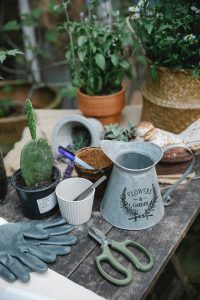Proper Maintenance Ensure Tools Longevity
In today’s eco-conscious world, using eco-friendly garden tools is becoming increasingly popular for both individuals and businesses. These tools are designed to minimize environmental impact and promote sustainability. However, just like any other tools, eco-friendly garden tools also require proper care and maintenance to ensure their longevity and optimal performance. In this comprehensive guide, we will take you through 9 essential tips for maintaining and extending the lifespan of your eco-friendly garden tools, helping you make the most out of your environmentally conscious investments.

9 Essential Tips For Garden Tools Maintenance
1. Clean After Each Use
After using your garden tools, make it a habit to clean them thoroughly. Removing dirt, debris, and plant residues from the tool’s surface is essential. This simple practice prevents the accumulation of corrosive materials that can degrade the tool over time, ensuring it remains functional and effective.
2. Dry Thoroughly
Ensuring your tools are completely dry before storage is crucial. Damp or wet tools are more susceptible to rust and other forms of corrosion, which can shorten their lifespan. After cleaning, take the time to wipe them down with a clean cloth and allow them to air dry completely before putting them away.
3. Apply Protective Coating
For metal parts, consider applying a thin coat of vegetable oil or another eco-friendly lubricant after cleaning and drying. This protective coating acts as a barrier against moisture and rust, significantly preserving the tool’s integrity and extending its lifespan.
4. Store Properly
Proper storage is vital to protect your eco-friendly gardening tools from the elements. Opt for a dry and sheltered area, such as a garden shed or a covered storage space. This safeguards them from rain and direct sunlight, preventing unnecessary wear and tear. Additionally, hanging tools on hooks or using a tool organizer helps maintain their shape and condition.
5. Sharpen Blades Regularly
Cutting tools, like pruners and shears, should be kept sharp and well-maintained. Dull blades not only strain the tool but also the user, leading to inefficient performance and potential damage to plants. Regularly sharpening the blades ensures cleaner cuts and significantly extends the life of the tool.
6. Lubrication
For tools with moving parts, apply eco-friendly lubricants or oils as recommended by the manufacturer. This helps reduce friction and ensures smooth operation
7. Perform Periodic Inspections
Regular inspections are essential to identify signs of wear, damage, or loose parts in your eco-friendly gardening tools. Addressing these issues promptly can prevent them from escalating into more significant problems. Pay special attention to handles, joints, and fasteners, as they are common areas of wear and tear.
8. Avoid Overexertion
Using your eco-friendly gardening tools within their intended purpose and capacity is crucial. Avoid applying excessive force on the handles or using the tools for tasks they are not designed for. Overexertion can lead to premature wear and reduce the tool’s overall effectiveness.
9. Follow Manufacturer’s Guidelines
Manufacturers provide specific maintenance and care instructions with their eco-friendly tools for a reason. Adhering to these guidelines ensures the longevity and optimal performance of the products. Whether it’s cleaning, sharpening, or storage, following the manufacturer’s recommendations is a proactive step towards maintaining your tools effectively.
Conclusion
By implementing these eight tips, you can extend the lifespan of your eco-friendly gardening tools and continue to support sustainable gardening practices. Proper maintenance not only helps the tools perform better but also reduces waste, contributing to a more eco-conscious lifestyle.
FAQs (Frequently Asked Questions)
How often should I clean my eco-friendly gardening tools? We recommend cleaning your tools after each use to prevent corrosive buildup and ensure their longevity.
Can I store my eco-friendly gardening tools outdoors? It’s best to store them in a dry and sheltered area, such as a garden shed, to protect them from the elements.
Is vegetable oil the best protective coating for metal parts? Yes, vegetable oil is an eco-friendly option that effectively acts as a barrier against moisture and rust.
How frequently should I sharpen the blades of my gardening tools? Regularly sharpening cutting tools is essential, and the frequency depends on how often you use them. As a general rule, aim for at least once every gardening season.
What should I do if I notice signs of wear in my tools? Address any signs of wear, damage, or loose parts promptly. Minor repairs are often easier and less costly than major ones.
Thanks for sharing. I read many of your blog posts, cool, your blog is very good.